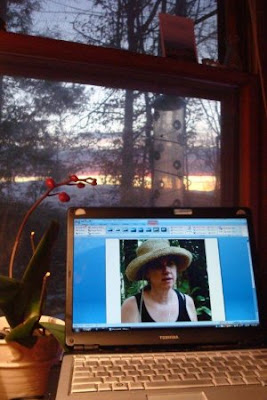
That unlikely cat-fancier William Burroughs found in their feline company an antidote to depression and suicide, and at the very least wondered what might happen to his companions when he was no longer able to care for them. Such tender mercies he extended to few in the human condition.
Online at the current Exquisite Corpse, Simone Ellis presents an interview with Burroughs that was done in 1989. As ever WSB strikes his favorite pose of irascible sage, which became his favorite guise to interviewers as he grew older. The author of The Cat Inside -- who was host to a succession of cat-familiars and other hangers-on -- found despair the unforgivable sin and worked on multiple projects to keep himself from peering into the inevitable abyss.
Here's Burroughs, worrying about the future welfare of his cats, amid the far-ranging chat from Egyptian hieroglyphics to spotting alien spacecraft:
WSB: Do you know that famous story about the Zen Master who appeared before the Emperor with his paintings? He bowed three times and disappeared into his paintings.
SE: ah ya. (laughs) do you think that will ever happen to you? Or does it often happen to you?
WSB: I hope. I hope. Yeah. (long pause) You know… I think the only really important function for people is to feed their …cats.
SE: (slightly uneasy laugh)
WSB: That would bother me more than anything else... when I pass. If I should die? That’s what would deter me from suicide… My cats … my cats… what would happen to my cats?
SE (an audible sigh, and then quickly…) Not that you’re gonna…. (Simultaneous with his reply…)
WSB: Not that I ever … everyone looks at me reeel funny when I say that I have never considered suicide.
SE: Never considered it?
WSB: Never considered it.

SE: … huh.
WSB: Never considered it.
SE: But you’ve haven’t always had cats, William?
WSB: uh… oh….no… well… I
SE: …but you had other reasons?
WSB: Well humm, I never considered suicide. Well whether you consider that there is a life after death or whether you don’t, I don’t see how suicide could be other than deleterious to your ummmm …chances.
SE: Deleterious?
WSB: Yes! I mean say you believe in life after death and you’ve committed suicide, what you’ve done is you have admitted the unforgivable sin of despair…
SE: (chuckles)
WSB: … that is you have not tried to come to grips with whatever problems that you’ve had. ...

















